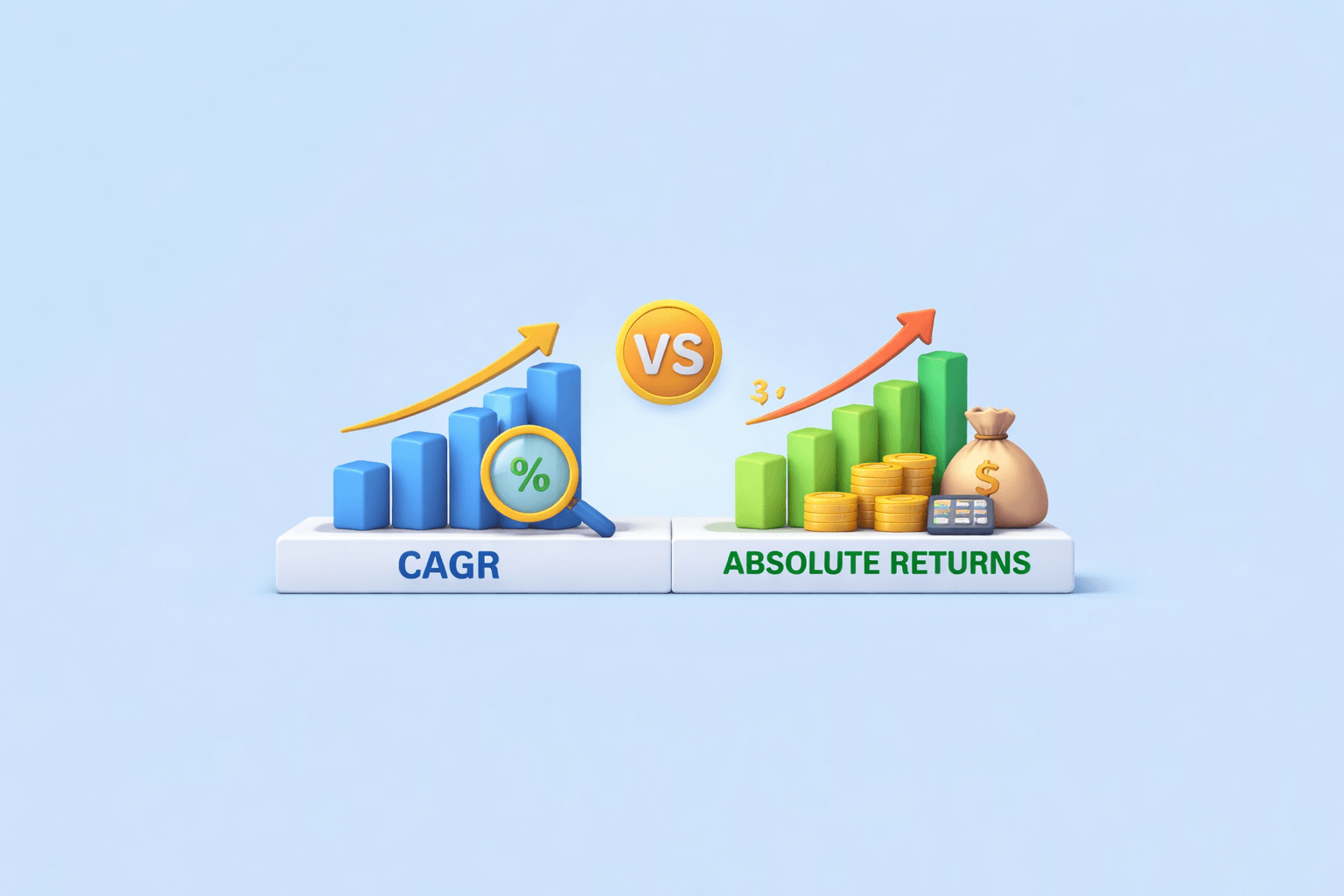What Is Intraday Trading?

- Published Date: October 16, 2024
- Updated Date: November 28, 2025
- By Team Choice
Intraday trading is the ‘purchasing and selling of stocks on a single day before the market closes’. It is usually done to maximise profits and avoid staying invested for prolonged periods, bearing market fluctuations.
Intraday trading is a high-risk trading method with higher profit potential due to the lower duration of the investment. In addition, intraday is famous for providing high profits, making it popular among many traders and investors. Intraday trading varies from standard or regular trading account in general.
How is Intraday Trading Different From Regular Trading?
Here are the ways in which day trading differs from regular trading:
| Parameters | Intraday Trading | Regular Trading |
|---|---|---|
| Duration | Same day | Days, months, or years |
| Liquidity | Highly liquid, as trades are executed quickly. | Less liquid, as selling may depend on market conditions and timing. |
| Profit | Potential for quick and significant profits, but with higher risk. | Potential for steady growth and dividends over time. |
| Market Analysis Focus | Price Fluctuations | Company performance |
| Trading Frequency | High frequency | Low Frequency |
| Risk | High risk due to volatile market | Low risk due to long-term investment |
Also read: Rules for intraday trading
What are the Features of Intraday Trading?
Intraday trading is a popular trading option that takes place on the same day. Here are some features of the intraday trading you should keep in mind:
1. High Risk and Reward
Although intraday trading has a highly fluctuating market and sees frequent price changes, there is also a huge space for high rewards. Due to its profitability, intraday trading has become more popular among people in the last few years.
2. No Shares Ownership
In intraday trading, one buys and sells the same amount of securities in a single trading day, hence no actual share ownership takes place. The traders will close their positions prior to the market closing, so one does not take any stock holding in the night. This is opposite to regular trading, where people buy shares and acquire full ownership, holding them in their possession.
3. Constant Analysis
The intraday trading market needs contact monitoring due to its high volatility. In fact, many traders spend a major chunk of their time studying market trends and understanding the patterns for a better choice of stocks to invest in.
4. Liquidity
Intraday trading has better liquidity than regular trading because the trades are closed on the same day. Traders exit their positions by the end of the trading day with minimum losses, making access to funds easier. You can quickly recover your money within a day by squaring off your positions.
5. Same Day Trade
The most distinct feature of intraday trade is that stocks are purchased and sold within the same day, making it a much faster process than regular trading. In addition, due to this feature, there is also no ownership of shares.
How to do Intraday Trading?
To successfully do intraday trading, traders are advised to follow a step-by-step process as mentioned below:
1. Open An Account
Begin by opening a Demat account with a trustworthy broker, majority of the them provide options to open free demat account and then learn more about the basics of trading, specifically intraday trading. Traders, especially beginners, are advised to stick to easy and user-friendly platforms to avoid any difficulty or confusion while dealing with the trade.
2. Pick the Highly Liquid Stocks
People are advised to pick highly liquid stocks when participating in intraday trading. Moreover, liquidity is also a significant distinguishing factor of intraday trade. Hence, after thorough analysis and research, people are advised to buy and sell the stocks of small and mid-sized companies for ease.
3. Note the Volatility
Intraday stocks generally have medium to high volatility, often leading to a sudden rise or fall in prices. Hence, any market value fluctuation over 3% is advised to be avoided during intraday trade to restrict the losses. In addition, people are advised to study the market thoroughly before trading intraday.
4. Make a Strategy
Having a strategy for the trade is a must when it comes to intraday trading. Before jumping into intraday trading, things like clearly defined goals and analysis tools must be clarified. In addition, checking one’s risk tolerance is important.
5. Monitor the Financial Market
Keeping updated on the information about the market and the listed companies is an important step for all kinds of traders, be they seasoned or newbies. In general, keeping an eye on the latest economic trends and updates regarding stocks can be very helpful in determining the best stocks to invest in.
6. Implement Risk Management
As intraday trading has a high risk-reward ratio, robust risk management is crucial. Some brokers offer leverage, allowing you to control more stocks with a small investment margin. Without efficient risk protocols, traders may face huge losses. Traders need proper learning and adequate experience to choose the right exit positions for profitability.
Also Know: best time frame for intraday trading
What are the Best Technical Indicators to use for Intraday Trading?
With the rapid fluctuations in the market, it is essential to do a technical analysis for Intraday trading using advanced tools. It is impossible to single out one indicator and use it to make trading decisions. You must use multiple indicators to find the right time to buy and sell stocks. Here are some of the best technical indicators for intraday trading:
1. Bollinger Bands
Bolliger band is a modern tool programmed with advanced technology to help the trader identify whether a particular stock is oversold or overbought. It shows three lines on the graph, with the first displaying a 20-day average and the other two being the deviations. If the market is volatile, the bands will widen.
2. Moving Average
The Moving Average is one of the best analysis tools for predicting price trends. This shows an average price of the stock over a duration that is customisable. Whether the trader is interested in intraday trading or wants to be a long-term investor, these tools assist in showcasing the prevalent trends of the market.
3. Relative Strength Index
The RSI also called the Relative Strength Index, is an advanced analysis tool that shows if the shares are overbought or oversold by analysing price changes. The tool has a spectrum of 0 to 100, on which if the RSI value is beyond 80, the stock is in an overbought state, while below 20 shows the oversold state.
4. Moving Average Convergence Divergence
MACD, also called the Moving Average Convergence Divergence, is a trading tool used to show the trends of stock price change. This tool shows trend continuation and discontinuation by using the difference between the fast-moving and the slow-moving averages. For a visual representation, MACD uses a histogram.
Also Read: What is tick trading
What are the Benefits of Intraday Trading?
Intraday trading has emerged as a popular trend in recent days. Here is why the trading type is so hyped up and the benefits of intraday trading:
1. No Overnight Risk
The positions are always closed before the market closes to avoid any overnight adverse price movements. You can harvest gains in one day by leveraging small intraday price movements. This, in turn, is less exposed to unexpected events that might affect stock markers while markets are still closed.
2. High Profits
Intraday trading has borne huge profits for many traders and continues to be popular for its high profit margin. With reduced risks, people usually turn to short selling to get better profits from their invested amount. Moreover, to earn better profits, applying strategies is important as well.
3. Liquidity
In intraday trading, all investments can be recovered at any time, as the traders please. Compared with traditional trading, traders investing intraday can very easily put in their money and withdraw it if they have any personal requirements.
4. Low Capital Requirements
In general, intraday trading requires less capital compared to long-term investing. With leverage, you can control larger positions with a smaller size of your money, which increases the potential return. At the same time, it also magnifies the risk involved.
Also read: intraday trading profit settlement
What are the Tips to Keep in Mind While Doing Intraday Trading?
Intraday trading, as opportunistic as it seems, can also be tricky. Hence, here are the tips to keep in mind while doing intraday trading:
1. Research
Researching the market and analysing the present trends is an essential part of any type of trading. However, when it comes to intraday, this becomes even more important since the purchase and selling of the stocks are done in a short duration, which calls for smart decisions.
2. Take Calculated Risk
The risks in intraday trading are high, and therefore, taking calculated risks that one can afford to lose is essential. Many traders are recommended to understand the trends with deep research and make careful decisions regarding the investments.
3. Do not Overtrade
The intraday market is always unpredictable, and thus, it is recommended that you trade only a certain amount in a single day to get the best out of it. Putting too much at stake can make gains harder and losses easier.
4. Performance Tracker
Tracking performance in intraday trading is essential. People tend not to monitor their losses and profits and make the same mistakes all over again. In addition, tracking performance helps in making better decisions in the future as well.
Also Read: How to select stocks for intraday trading
How do you do Risk Management in Intraday Trading?
Intraday trading, though profitable, can be risky and tricky at times. Here are the tips for risk management in intraday trading:
1. Enter and Exit at the Correct Time
Knowing when to enter the market and exit within the same day is a key element of mastering the craft of intraday trading. In addition, people can take low-risk entries hoping for higher gains and exit when they have reached the target gain or fallen to the loss limit set.
2. Stop Loss is Important
Having a stop loss is important so as not to incur hefty losses. Setting a limit on the loss one can take can lead to restricting bitter losses. In addition, it is also essential to have different price points at which the trader is willing to exit and not just one target level.
3. Study Patterns
Although the stock market is unpredictable, it is always wise to study the market and analyse its trends beforehand to understand the pattern. It is also essential to have thorough research to prevent big losses since history repeats itself more often than expected.
4. Prevent Getting Impulsive
Impulse control is very important when performing a trade since emotional biases like fear and greed can easily take control of the trader’s mindset and derail them from the strategy already set.
5. Always Start Small
Starting small is a good way to rise since the losses are usually small at this time, and the profit gained can boost confidence when starting. Hence, having small investments at first is a good idea. As one becomes more experienced, the trade volume may be increased.
Also Read: Is intraday trading profitable
Assume that on a particular day, the opening price of Reliance Industries Limited (RIL) is ₹2,500 per share. A trader notices an uptrend and buys 100 shares at this price, thereby investing ₹2,50,000.
In the middle of the day, the stock reaches ₹2,550. The trader decides to sell his shares at this value. The amount of profit earned per share would be ₹50. So, by selling 100 shares, he earned a total profit of ₹5,000.
However, if the stock starts to lose its value and reaches ₹2,450 a share at mid-day, the trader may incur a loss of -₹50/- per share, aggregating to -₹5,000/- for 100 shares.
Essentially, the above example reveals that intraday trading in high-liquidity stocks helps garner quick returns based on intraday price movements while avoiding overnight risks. At the same time, unfavourable market movements can result in losses of a higher magnitude.
The Key Takeaway
Intraday trading has been in bloom in recent years for its high profit and high-risk profile. However, day trading is also classified as one of the trickiest. Traders with experience and ample practice go through extensive market research to find stocks worth investing in. Moreover, intraday trading with the correct strategy, tools, and knowledge can be an extremely profitable venture.
If you want to know more about the stock market, then check out Choice Blogs and get the latest information on the stock market.
FAQs
1. How does intraday trading work?
Intraday trading is the frequent buying and selling of stocks within the same day before the market closes that day. It is also called day trading. You can open trading account now & begin your trading journery.
2. How are regular trading and intraday different?
Regular trading and intraday trading differ in stock delivery. Intraday trading is done on the same day, and there is no transfer of ownership of shares overnight here, while traditional trading involves buying and holding shares for some period before selling.
3. How do you choose stocks for day trading?
While researching the market and analysing its trends is essential for picking the best stocks for day trading, practice is essentially what makes a trader expert at choosing the best stocks.
4. What type of analysis is needed for intraday trading?
To find the right stocks for intraday trading, both fundamental and technical analyses are required. Many market indicators can be leveraged to speculate on stock price movements. While a study of market patterns is essential, a thorough knowledge of the company is required, too.
5. What type of traders should do intraday trading?
People with high-risk tolerance and who are able to come up with quick strategies are the type of traders who should indulge in intraday trading due to its volatility. There is also a possibility of losing your investment capital and thus, a robust risk management strategy is crucial.
6. Intraday Trading timing in India
The timing for intraday trading starts at morning 9.00 to the evening at 3.30 and Saturday and Sunday off.
Recommended for you

CAGR Vs Absolute Returns in Mutual Funds: Key Differences You Should Know

FII DII Data - Live Data

Share Market Prediction For Tomorrow
